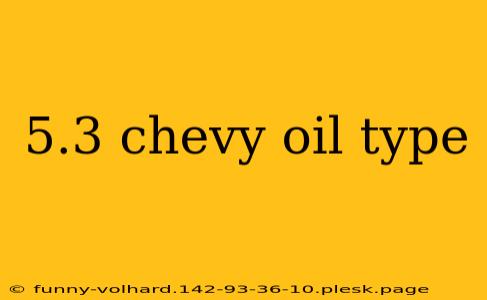Choosing the right oil for your 5.3L Chevy engine is crucial for its longevity and performance. This guide will delve into the specifics of oil type, viscosity, and other critical factors to ensure your engine stays healthy and happy for years to come.
Understanding Your 5.3L Chevy Engine
The 5.3L Vortec engine, a popular choice in various Chevrolet trucks and SUVs, demands specific oil characteristics to operate efficiently. Understanding your engine's requirements is the first step towards proper maintenance. Factors like year of manufacture, driving conditions, and modifications all play a role in determining the ideal oil type.
Key Factors Influencing Oil Selection:
- Year of Manufacture: Older 5.3L engines might have slightly different specifications than newer ones. Always consult your owner's manual for the most accurate information.
- Driving Conditions: Severe driving conditions, such as frequent towing, off-roading, or extreme temperatures, necessitate a higher-quality oil with enhanced protection.
- Modifications: Performance modifications, such as upgraded camshafts or superchargers, can significantly alter your engine's needs, potentially requiring a different oil viscosity or type.
Deciphering Oil Viscosity: The Numbers Matter
Oil viscosity is measured using the SAE (Society of Automotive Engineers) rating system, expressed as a number (e.g., 5W-30, 10W-30). This rating indicates the oil's thickness at different temperatures. The "W" stands for winter, and the numbers represent the oil's flow characteristics at low and high temperatures.
- The First Number (Before the W): Indicates the oil's low-temperature viscosity. A lower number means better cold-weather performance, allowing for easier starting and quicker lubrication.
- The Second Number (After the W): Indicates the oil's high-temperature viscosity. A higher number means thicker oil at high temperatures, providing better protection against wear at elevated operating temperatures.
For most 5.3L Chevy engines, 5W-30 is a common and often recommended viscosity. However, always refer to your owner's manual for the manufacturer's specific recommendation. Using the wrong viscosity can lead to reduced engine performance and increased wear.
Oil Type: Conventional, Synthetic, or Synthetic Blend?
The type of oil you choose affects its performance and longevity. There are three main categories:
- Conventional Oil: The most affordable option, but it offers the least protection and requires more frequent changes.
- Synthetic Blend Oil: A balance between cost and performance. It offers better protection than conventional oil but is less expensive than fully synthetic.
- Full Synthetic Oil: The highest-performing option, providing superior protection, extended drain intervals, and better performance in extreme temperatures. It's the recommended option for severe driving conditions or for maximizing engine lifespan.
Your choice depends on your budget and driving habits. For optimal engine health and performance in your 5.3L Chevy, full synthetic oil is generally the best investment.
Checking Your Oil Level and Choosing the Right Oil Filter
Regularly checking your oil level is essential. Use the dipstick to ensure your oil level is within the recommended range. Also, remember to replace your oil filter at each oil change. Choosing a high-quality filter is just as crucial as choosing the right oil.
Conclusion: Prioritizing Your 5.3L Chevy's Health
Selecting the correct oil type and viscosity is fundamental to the health and performance of your 5.3L Chevy engine. Always consult your owner's manual for specific recommendations, taking into account your driving style and environmental conditions. Regular oil changes and diligent maintenance will ensure your engine runs smoothly for many years to come. Remember, preventative maintenance is far more cost-effective than costly repairs down the line.

